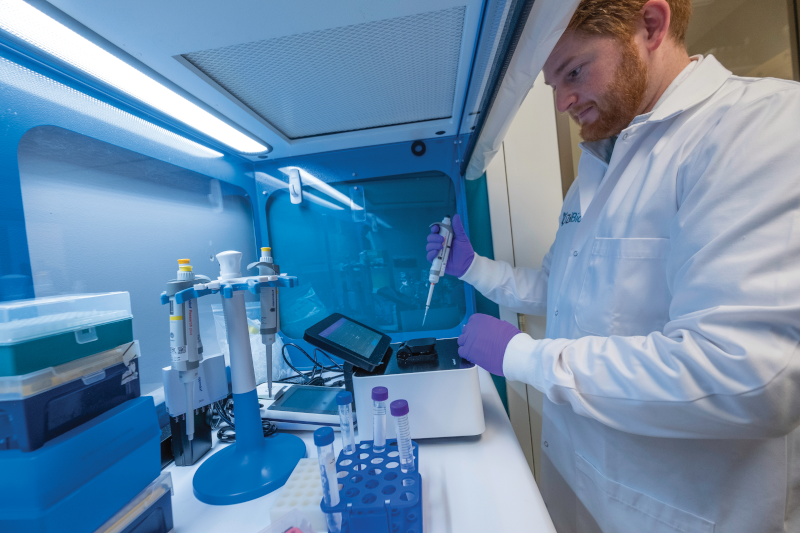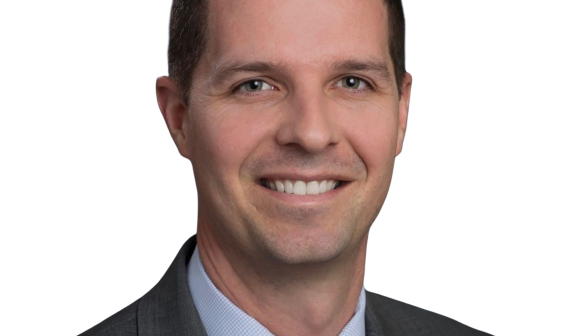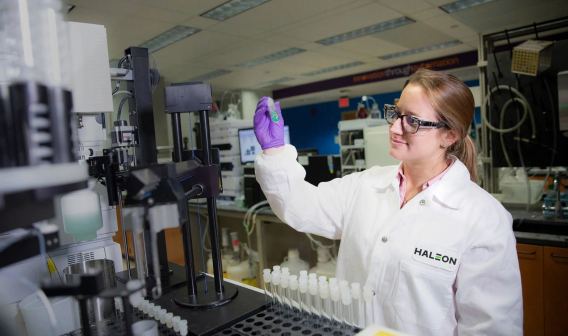UVA Supports Expanding Life Sciences Industry in Charlottesville
Kimberly Kelly was a biomedical engineer at the University of Virginia (UVA), working on ways to diagnose pancreatic cancer, when she discovered a protein expressed by the cancer cells. She found she could detect this cancer-specific plectin with imaging, so she applied for a financial award to get the detection technology from theory to realization.
Kelly won the award, left the university, and sought out the support of the Charlottesville life sciences community as she began her own company. “Charlottesville is really up and coming because we have that confluence of good living conditions, access to really good people, and the knowledge of people who have been there, done that, and are willing to help. Charlottesville is a very collaborative environment,” she said.
In 2016, she launched a business, pivoted, renamed the company ZielBio, Inc., and focused on developing an antibody that blocks the protein, preventing it from dividing and metastasizing. In preclinical experiments, ZielBio’s monoclonal antibiodies target and kill cancer cells and prompt immune cells to destroy tumors. Targeting cancers with this protein would ideally lead to better outcomes in cancer patients. In January, the company began clinical trials of the antibodies.
Keys to Success
Life sciences companies like Kelly’s contribute $8 billion to the Virginia economy, according to Virginia Bio, a nonprofit trade association that represents the life sciences in the Commonwealth. In Charlottesville, ZielBio is one of more than 75 biotechnology companies that now operate in Central Virginia. Entrepreneurs, many of them scientists, have begun companies in a number of sectors, including therapeutics, devices and instrumentation, and health and technology, resulting in nearly 2,000 jobs in the Charlottesville area.
Companies that help diabetics (TypeZero Technologies, LLC), create treatments for rare metabolic disorders (HemoShear Therapeutics, Inc.), and manufacture sterile, injectable drugs (Afton Scientific, LLC) are thriving in the city, thanks to a close relationship with UVA and a growing cadre of entrepreneurs who collaborate through CvilleBioHub, an industry-led nonprofit that supports the area’s biotechnology community. Success stories include the Focused Ultrasound Foundation, devoted to accelerating the development and adoption of focused ultrasound technology to better treat medical disorders, and AgroSpheres, Inc., which is developing bio-based solutions for crop protection to lessen reliance on chemical pesticides.
The talent and growth of the industry have also attracted investors. Charlottesville now has three early-stage investor groups, the Charlottesville Angel Network (CAN), CAV Angels, and the University of Virginia Licensing & Venture Group Seed Fund (UVA LVG Seed Fund), which invests in concepts developed by researchers at the university and contributed $276.1 million to 27 companies between 2010 and 2019.
A Pipeline Through UVA
Much of the industry’s success wouldn’t be possible without the talent that comes out of UVA, which has developed various ways to support researchers. The university is a strong engine of research, says Pace Lochte, UVA’s assistant vice president for economic development. Last year, the university brought in $437 million for research, a 40% increase from the $311 million in funds received by the school seven years ago. About half of that comes from National Institutes of Health grants.
“Our role is to make the commitment and be a catalyst for others to come in and join our financing,” says Bob Creeden, managing director of UVA LVG Seed Fund & New Ventures. “It really does allow the university to push technology out into the marketplace.”
Charlottesville is really up and coming because we have that confluence of good living conditions, access to really good people, and the knowledge of people who have been there, done that, and are willing to help. Charlottesville is a very collaborative environment.
One of those companies was BrightSpec, a business built around technology created by UVA chemist Brooks Pate. The company, founded in 2012, developed a new method of spectroscopy to quickly analyze the efficacy of pharmaceuticals and detect trace amounts of potentially harmful chemicals using digital tools.
Another was TypeZero, which focuses on technology that helps diabetics manage their insulin. A closed-loop system consisting of a blood glucose sensor and an insulin pump — an idea originally developed 15 years ago by UVA scientist Boris Kovatchev — functions as an artificial pancreas to automatically adjust the amount of insulin a patient needs, releasing him or her from the burden of constant finger pricks to check glucose levels. In 2018, the company was sold to DexCom, which opened an office in Charlottesville and dramatically expanded the number of people who could use the technology, which now helps 300,000 patients.
Help From a Support Network
The life sciences community is further connected by CvilleBioHub, which brings entrepreneurs and early-stage companies together, helps researchers develop ideas, and provides educational opportunities about the industry in Charlottesville.
Our role is to make the commitment and be a catalyst for others to come in and join our financing. It really does allow the university to push technology out into the marketplace.
In 2016, local biotech executives Martin Chapman, Taylor Cope, Nikki Hastings, and Susan Klees began the group as they saw the industry expanding. “It seemed to me that if we got together, collaborated, and understood the community more,” said Klees, who now works at HemoShear Therapeutics, “we might be able to better serve them, and help them grow and flourish.”
Roughly 50% of area life sciences companies are launched as a result of spinout ideas and technologies at UVA, says executive director Steph Oettinger: “The university is a driver and an intellectual horsepower for the new ideas that are percolating in our community.”
[The University of Virginia] is a driver and an intellectual horsepower for the new ideas that are percolating in our community.
Two years ago, the organization also received a grant from GO Virginia, a state economic development initiative, which helped it fund an entrepreneur-in-residence program. To date, that program has served more than 30 companies and resulted in the creation of six more. CvilleBioHub hopes to double the size of the industry in the region by 2030. In 2020, GO Virginia approved a grant to help fund similar organizations across the Commonwealth, in part because of the successful model developed by CvilleBioHub.
“Strong partnerships like those between UVA, CvilleBioHub, and others contribute to an exceptionally supportive environment,” Lochte said. “The success of our biotech sector is wholly dependent on the unique contributions and collaborative spirit of the many dedicated organizations and individuals within the ecosystem.”





